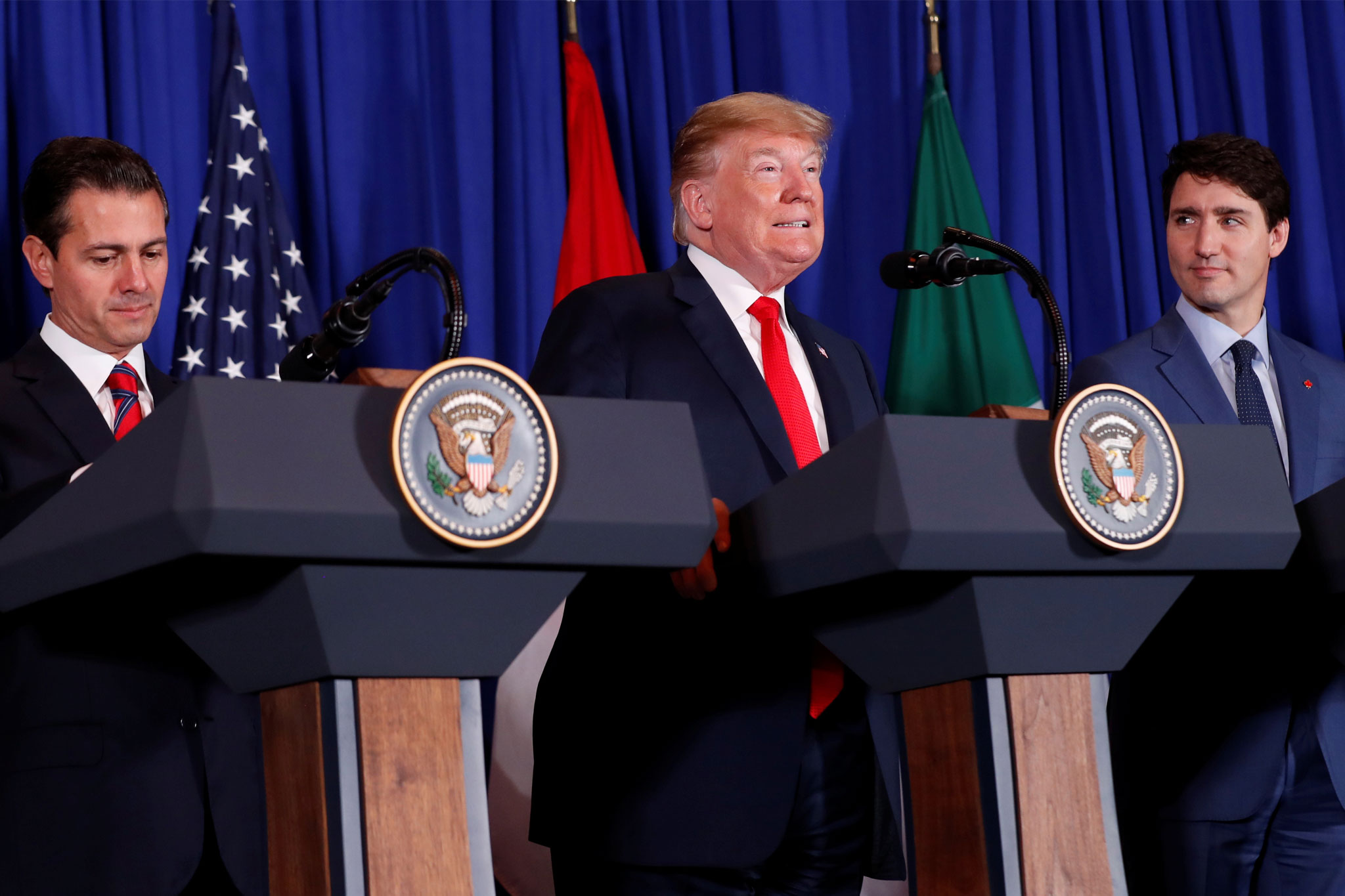USMCA is “dead, it no longer exists.”
This interview by Alfredo Valadez Rodríguez of Enrique Dussel Peters originally appeared in the October 20, 2025 edition of La Jornada, Mexico’s premier left wing daily newspaper. The views expressed in this article are the author’s own and do not necessarily reflect those of the Mexico Solidarity Project.
Zacatecas, Zacatecas. The North American Free Trade Agreement between Mexico, the United States and Canada (USMCA), as we had known it until recently, “is dead, it no longer exists,” because “a group of unilateral tariffs that were not foreseen” in the original treaty has been imposed, and limits on the payment of tariffs have been broken, going from an average payment of 0.25 percent covering Mexican exports to North America in 2024, up to 25 percent on average this year, Enrique Dussel Peters, coordinator of the China-Mexico Studies Center at the Faculty of Economics of the National Autonomous University of Mexico (UNAM), said in an interview.
He maintained that, from his perspective, there will be no revision of the USMCA in 2026, due to the aggressive tariff policy the United States has imposed on its trading partners. He also warned that if Mexico unilaterally imposes tariffs on China, as has been proposed, our country “is heading toward a dead end.”
“The average tariff that Mexico paid on its exports to the United States in 2024 was 0.25 percent, and not on all products, but now it applies to more than 15,000 items and has risen to ten digits on average. We’re discussing a tariff close to 25 percent, which has just included trucks. Furthermore, the jury is still out (for other products), whether it’s steel, yes, aluminum, too, and auto parts, etc., etc..”
On the other hand, Mexico will never be able to “reach the average tariff” with the United States, “since 60 or 70 percent of U.S. imports to Mexico will not pay tariffs,” said Dussel Peters in an interview at the end of his participation in the International Seminar on Extractivism, organized by the Autonomous University of Mexico Xochimilco and the German foundation Friedrich Ebert Stiftung, which brought together researchers from Latin America.
“I fear, and I hope I’m wrong, that the USMCA is dead. Goodbye, good night,” the Mexican economist quipped, predicting that, “what we’re going to see next year, with luck, are bilateral negotiations between the United States and Mexico, the United States and Canada, and they’re going to treat us the way Trump loves: with blackmail.”
The specialist stated: “In its bilateral negotiations, the Republican government will blackmail Mexico and Canada, reciprocally: “If you don’t give me or improve the benefits (that Canada offers me), ‘you’ll be left out,’ and it will say the same to Canada: ‘Mexico already promised me that we will allow oil exploitation,’ if you don’t give me the same, then you’ll be left out, etc. Then we will have two bilateral trade agreements rather than one between three countries.”

Mexico at a Crossroads of Trade: US or China
Asked if he agrees that Mexico’s Manifest Destiny, in terms of trade, must necessarily be with the United States, due to our geographical proximity and shared border of more than three thousand kilometers—as many researchers and politicians suggest—and that improving or increasing relations with China should be put on the back burner, Enrique Dussel debunked this argument spread by Western-aligned media.
To begin with, Dussel Peters proposed, “we must lay the groundwork to understand, at least minimally, the real position that both foreign nations occupy in global trade and the economy,” and not just limit ourselves to the dissemination of U.S. executive orders, “but Mexican elites, business organizations, academics, and the Mexican public sector have dedicated 99.9 percent of their attention to Washington.”
Paradoxically, the researcher asked, “Have we forgotten the world’s largest economy? According to the International Monetary Fund, measured in purchasing power since 2016, China is the world’s largest economy. That’s beyond our understanding. It’s not just large, no, but the most dynamic. Furthermore, that economy is the most innovative. There’s a very valuable set of studies by the Asia-Pacific Confederation of Trade and Industry (APCIC), which suggests that over the last 25 years, China has dominated in terms of its companies’ leadership in innovation in specific global value chains.”
Mexican elites, business organizations, academics, and the Mexican public sector have dedicated 99.9 percent of their attention to Washington.
Therefore, the coordinator of the Latin American and Caribbean Academic Network on China maintained, for Mexico, “the discussion is not about the United States or China, but rather the United States and China. We have to dedicate time to it—the public sector, business organizations, academia, political parties, and the legislative branch. What is China proposing? We don’t even know!”
After all, “not that, because of the geographical issue, the 3,000-kilometer border. All these arguments… that’s false,” because “in 2024, China, for the first time, broke the 20 percent barrier for Mexican imports.”
“Possible dead end”
And as a trade policy, Mexico must analyze whether it will unilaterally impose tariffs on China, as the United States does with our country, because that is a huge risk. He asked: “Are we going to unilaterally impose a tariff of up to 50 percent on Chinese imports? Will Mexico repeat everything we complain about Trump in 2025 with China? That’s very strong, because then China will do the same thing in the short term, and if this continues as it is, we’re headed straight for a dead end.”
-
Workers Party Claims Sheinbaum Electoral Reform Will Eliminate Party System
The socialist party’s leader recalled the democratic spaces that the left managed to conquer with the 1977 & 1996 reforms, a “fruit of countless struggles, repressions, imprisonments, disappearances and even armed uprisings.”
-
Anti-FIFA Challenge: Football Defends the Territory
Mexico City residents are organizing Anti-World Cup Days to protest water theft and gentrification that have accompanied preparations for the World Cup, put on by the corrupt, international criminal consortium known as FIFA.
-
Tridonex Strike in Matamoros to Start March 6th
1,300 workers are expected to strike, demanding the company fulfill its obligation to pay workers in full. Tridonex is owned by First Brands, the US autoparts corporation accused of massive fraud.




